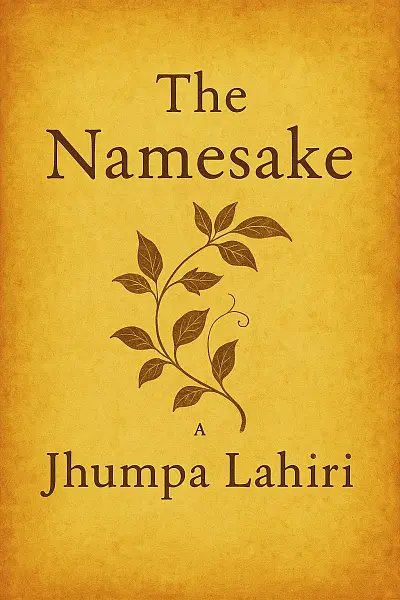
The Namesake
by: Jhumpa Lahiri
Gogol Ganguli grows up in suburban Massachusetts, the child of Bengali immigrants navigating the highs and lows of their new American lives. When his parents give him an unusual name tied to both trauma and heritage, Gogol finds himself caught between two worlds—desperate to fit in, yet tethered by tradition.
Everything shifts as he learns the story behind his name, forcing him to confront what it means to belong. Gogol struggles with expectations, identity, and love, risking heartbreak and alienation at every turn. Intimate, observational, and beautifully detailed, The Namesake pulls us right into his tangled search for self.
"“Home is not a place on a map, but the quiet stitching together of memory and belonging within the heart.”"
Let's Break This Down
The Author's Voice
Atmosphere
Delicate, introspective, and quietly evocative., Lahiri wraps the world of The Namesake in a gentle glow of nostalgia and longing. Expect neighborhoods ringing with quiet tension, subways humming with loneliness, and family kitchens heavy with unspoken emotion. Every setting feels intimate and deeply lived in, with whispers of both joy and melancholy lingering in the air.
Prose Style
Sparse yet poetic. Lahiri’s language is crystal clear, almost deceptively simple, but every sentence shimmers with layered meaning. She resists flourish and melodrama, instead painting with subtle brushstrokes—one moment you’re laughing at an awkward family encounter, the next you’re feeling an ache of cultural dislocation. Dialogue is natural, unforced, and often loaded with what’s left unsaid. It’s the kind of writing that draws you in with quiet power rather than pyrotechnics.
Pacing
Measured, deliberate, and ever-so-patient. Don’t expect wild plot twists or a racing pulse; the story unfolds at the steady pace of real life. Time slips forward gently through vignettes and everyday moments, taking its time to linger over small details—an awkward college party, the taste of a childhood meal, the passing of seasons. This is a book for readers who appreciate soaking in emotional nuance rather than speeding from event to event.
Characterization
Intimate and multi-layered. Lahiri has a magnetic touch with characters, especially in capturing their internal worlds. She peels back their defenses gently, revealing their insecurities, hopes, and quiet regrets. Every character feels fully dimensional, and even minor figures pop with authenticity and specificity.
Themes and Mood
A beautiful mix of yearning, quiet heartbreak, and hope. Expect deep dives into questions of identity, belonging, and the bittersweet ambiguities of bicultural life. There’s a tender, lingering sadness—but also moments of warmth, wit, and connection. The mood flows between wistful and warmly humane, leaving you with lots of food for thought (and maybe a lump in your throat).
Overall Rhythm and Feel
Reading The Namesake is like moving through a cherished photo album: each chapter feels like a snapshot, brimming with memory and emotion. The book invites you to pause, reflect, and savor—perfect for anyone who loves introspective fiction that lingers long after the final page.
Key Moments
- Unforgettable train wreck scene that shatters Gogol’s family forever
- Gogol’s name as a lifelong curse and blessing—identity crisis in every chapter
- Intimate glimpses of immigrant loneliness through Ashima’s quiet mornings in Cambridge
- Love, heartbreak, and bad parties—Gogol’s tangled romances hit differently
- Jhumpa Lahiri’s prose: crisp, understated, secretly devastating
- Generational tug-of-war: Bengali roots vs. American dreams
- A suitcase, a book, and the startling power of memory
Plot Summary
The Namesake traces the life of Gogol Ganguli, born to Bengali immigrant parents in Massachusetts. The novel opens with Ashoke and Ashima’s arranged marriage and their move to the US, centering on their struggle to adapt. Gogol, named after his father’s favorite Russian author after a brush with death, grows up torn between his parents’ Bengali traditions and his American upbringing. As he comes of age, Gogol legally changes his name to “Nikhil,” distances himself from his heritage, and pursues relationships with non-Indian women, culminating in a marriage that later dissolves. By the end, after the death of his father and several personal hardships, Gogol comes to appreciate his cultural roots, reconciling his dual identity as both Indian and American.
Character Analysis
Gogol is the heart of the story—a complex, relatable figure grappling with questions of identity, belonging, and family expectation. He evolves from a rebellious teenager, embarrassed by his name and heritage, into a more mature adult who embraces his background. Ashima, Gogol’s mother, initially feels isolated in America, but gradually carves a space for herself and becomes fiercely independent by the novel’s end. Ashoke, Gogol’s father, is a quiet, intellectual presence who shapes Gogol’s destiny with the weight of his past and serves as an anchor of both tradition and compassion in the family.
Major Themes
Identity and naming take center stage, with Gogol’s discomfort over his unusual name symbolizing his broader struggle to define himself. Immigration and assimilation are woven throughout—Lahiri beautifully depicts the loneliness, adaptation, and contradictions of immigrant life, through both the parents’ and Gogol’s eyes. The power of family and the tug-of-war between generational expectations and personal choice resonate deeply; for example, Gogol’s changing relationship with his parents mirrors his shifting connections to his heritage. Finally, the novel explores loss and change—through death, failed relationships, and growing up—and the resilience required to move forward.
Literary Techniques & Style
Lahiri’s writing is marked by understated elegance: calm, precise, and evocative, never showy but always poignant. She uses a third-person limited perspective that grants deep insight into her characters’ inner worlds. Symbolism is strong—Gogol’s name itself, train journeys, and homes represent larger ideas of self, transformation, and belonging. Details of everyday life are rendered with sensory richness, and the narrative structure, which passes through decades in incremental shifts, mirrors the slow accumulation of identity over time.
Historical/Cultural Context
Set from the late 1960s to the early 2000s, the book reflects the lived reality of Indian immigrants forging new lives in America. The story spans locations like Calcutta, Cambridge, and New York, highlighting cultural dislocation and adaptation. Lahiri draws on her deep knowledge of Bengali customs, food, and rituals—contextualizing the Gangulis’ journey in the broader narrative of American multiculturalism and the push-pull immigrants often feel between two worlds.
Critical Significance & Impact
The Namesake is celebrated for its honest, intimate portrayal of immigrant life and identity crises, resonating with readers across backgrounds. Lauded for its lyrical prose and keen psychological insight, it has become a touchstone in contemporary American literature, often studied in schools for its exploration of culture, family, and belonging. Its influence endures, helping shape conversations about what it means to live between cultures and the bittersweet nature of forging a new self.

Between two worlds, a name holds the key to identity and belonging
What Readers Are Saying
Right for You If
If you’re into books that dig deep into identity, family, and the whole “where do I fit in?” feeling, The Namesake is totally up your alley. Seriously, if you love novels that follow characters across years and countries, watching them wrestle with big questions and quiet moments, you’ll probably get hooked. Fans of character-driven stories—think Jhumpa Lahiri’s other work, or books by authors like Chimamanda Ngozi Adichie or Celeste Ng—will find lots to love here.
If you geek out over stories about the immigrant experience, generational clashes, and coming-of-age moments, this one checks all the boxes. It’s also kind of a must for anyone who appreciates beautiful, understated writing. Lahiri writes in this calm, thoughtful way that sneaks up on you—no melodrama, just plenty of real emotion.
But, heads up: If you’re looking for fast-paced action, wild twists, or big plot fireworks, you might find this one a bit slow. The plot is gentle and almost meditative—more about the characters’ inner lives than what’s happening around them. If you need a book that grabs you by the collar on page one and never lets go, this probably isn’t your pick.
Oh, and if you’re not super into stories that linger on cultural identity, family expectations, and the bittersweet parts of life, you might want to skip it. But for anyone who loves reflective, beautifully written fiction that really makes you think? Highly recommend giving The Namesake a shot.
What You're Getting Into
Looking for a poignant, beautifully written family story?
The Namesake by Jhumpa Lahiri follows Gogol Ganguli, the American-born son of Indian immigrants, as he navigates growing up between two cultures in bustling Massachusetts. Torn between the expectations of his Bengali heritage and his longing to fit in with his American peers, Gogol wrestles with questions of identity, belonging, and the meaning behind his unusual name.
If you love richly-drawn characters and stories that explore family, roots, and self-discovery, this warm, contemplative novel is definitely worth getting lost in!
Characters You'll Meet
-
Gogol Ganguli: The novel’s thoughtful protagonist, he grapples with his Bengali-American identity and the weight of his unconventional name throughout his coming-of-age journey.
-
Ashoke Ganguli: Gogol’s introspective father, whose immigration to America and a fateful train accident deeply shape his perspective and the family’s trajectory.
-
Ashima Ganguli: Gogol’s empathetic mother, who struggles with adapting to American culture while yearning for her roots, ultimately finding strength and independence.
-
Moushumi Mazoomdar: Gogol’s intellectual and complex wife for a brief period, whose own cultural struggles and desires for freedom impact their relationship.
-
Sonia Ganguli: Gogol’s caring younger sister, who provides emotional support to the family and carves out her own path while maintaining close ties.
More Like This
If The Namesake tugged at your heart with its tender portrayal of cultural tension and longing, you might feel a familiar resonance with Americanah by Chimamanda Ngozi Adichie—both novels are luminous explorations of identity, migration, and the complex push and pull of home versus belonging. Where Lahiri weaves delicate threads around family expectations and the bittersweet ache of living between worlds, Adichie brilliantly examines race, reinvention, and the immigrant experience, making these books kindred spirits on different continents.
Another striking parallel comes with Celeste Ng’s Everything I Never Told You. Both books unravel through the lens of first-generation children contending with their parents’ dreams and societal pressures. The subtle way The Namesake unpacks generational misunderstandings and hidden emotional currents is sure to strike a similar chord for fans of Ng’s moving, quietly devastating domestic drama.
On screen, The Farewell (starring Awkwafina) echoes Lahiri’s work in its poignant, sometimes bittersweet mosaic of family secrets, clashing traditions, and gentle humor. Both stories deftly balance the pain and beauty of bridging old worlds with new ones, inviting viewers and readers alike into the tangled, loving mess of diasporic family life.
Critic's Corner
Have you ever felt like your very name—a simple word—ushers you into a lifelong search for belonging? The Namesake by Jhumpa Lahiri grapples with the astonishing weight of identity, asking: Can we ever escape the labels chosen for us, or must we redefine them on our own terms? Through the Ganguli family’s journey, Lahiri probes the messy intersection of heritage and selfhood with sharp empathy, inviting us to see ourselves mirrored in their struggles for place and purpose.
Lahiri’s prose is remarkable for its intimacy and restraint. She relies on small gestures—an awkward phone call, the lingering scent of cardamom, a sidelong glance—to evoke a vast emotional landscape. Her third-person narration is unassuming but precise, shining a gentle, persistent light on each character’s inner world. There’s an artistry in her details: the texture of a train seat, the tension in a festive kitchen. Her language is never indulgent; rather, it’s acutely observed, carrying a quiet emotional resonance that builds by accumulation. At times, this restraint can verge on coolness, but it’s through her understated touch that heartbreak—homesickness, familial disappointment, yearning—echoes all the more loudly. The pacing is deliberative rather than propulsive; the book is less concerned with dramatic plot twists and more with the silent revolutions that move people from one version of themselves to another. Lahiri’s dialogue is natural and revealing, often allowing what’s left unsaid to weigh heavily between characters.
At its core, this novel is a meditation on belonging that pulses with cultural immediacy. Lahiri deftly explores the generational push and pull of immigrant identity: the longing for roots versus the ache for assimilation. Gogol’s name is both a burden and a cipher—symbolizing everything unresolved between tradition and reinvention. The emotional stakes of the story are universal: the struggle to honor legacy without being bound by it, the difficulty of forging a self amid clashing expectations. Lahiri’s attention to generational silence, the gulf between immigrant parents and American-born children, feels especially urgent in today’s globalized world—where questions of identity, home, and heritage remain pressing. There’s a subtle, profound commentary on the way small, inherited rituals fortify or alienate; on how our self-understanding is constructed, deconstructed, and sometimes inherited without consent. The Namesake doesn’t offer simple resolutions, but it compels us to interrogate our own relationships with naming, belonging, and the invisible scaffolding of family.
In relation to both Interpreter of Maladies and the broader diaspora genre, The Namesake stands out for its intergenerational sweep and its refusal to romanticize either homeland or new world. Lahiri’s approach hovers somewhere between the spare realism of Anita Desai and the emotional delicacy of Alice Munro. While echoes of earlier immigrant sagas remain, Lahiri’s gift is her ability to make the nuances singular and deeply personal. This is a work that quietly updates the coming-of-age novel and the American immigrant story alike, expanding their emotional registers.
Weaknesses? Occasionally, the narrative’s subtlety feels bordering on aloof; secondary characters can appear faintly drawn. But these are minor blemishes in a story so finely tuned to the ache and humor of dislocation. For readers attuned to quieter dramas and searching for a story that respects the complexity of identity, The Namesake is essential—a quietly devastating, enduring modern classic.
Community Thoughts
when ashima tried to recreate home in a tiny cambridge apartment, it hit me hard how distance and longing become characters themselves. her quiet strength lingers with me, like a soft echo at midnight.
Why did Gogol’s name bother me so much at first? Suddenly, every page had me questioning my own roots and waking up at 3am thinking about identity. Jhumpa Lahiri messed with my dreams, honestly.
I can’t stop thinking about Ashima’s loneliness in that tiny Cambridge apartment, making her own world from scratch. That scene just sits with you, quietly powerful and so real it aches.
that train scene. oh my god. I kept thinking about Ashoke’s accident for DAYS. literally every time I heard a train whistle, I got chills. Lahiri knows how to haunt a reader, no question.
There’s this one scene at the train station with Ashoke that just clings to my brain. Every time I think of missed chances or fate, I picture him and that moment shifting everything forever. Lahiri’s quiet power sucker-punched me right there.
Leave Your Review
Local Take
Why It Matters
The Namesake by Jhumpa Lahiri resonates deeply with readers in the United States, especially among first- and second-generation immigrants. The story’s exploration of identity, belonging, and the tension between tradition and assimilation feels super familiar in a country built on waves of migration.
- Parallels with American history are hard to miss: Think about the post-1965 Immigration Act, which, like in Gogol’s family, suddenly brought a surge of Asian families navigating an unfamiliar world—kids caught between their parents’ customs and the American mosaic.
- Cultural values clash and align in interesting ways: The US loves individuality and reinvention, just like Gogol’s desire to change his name and shape his destiny. But the pull of family and honoring your roots pushes back, echoing immigrant households everywhere.
- Some plot points hit hard here: Moments when the Gangulis face microaggressions or the pain of cultural invisibility feel particularly raw to Americans who’ve navigated “in-between” identities.
And when you compare it to American immigrant literature—think Amy Tan or Chimamanda Ngozi Adichie—Lahiri’s restrained, quiet, deeply interior narrative stands out, capturing the poignant messiness of belonging here.
Food for Thought
Notable Achievement / Cultural Impact:
-
The Namesake by Jhumpa Lahiri was a finalist for the 2003 Los Angeles Times Book Prize and has become a modern classic, widely praised for its heartfelt exploration of immigrant identity and generational divides.
-
This novel has had a lasting impact, becoming a staple on school and university reading lists and sparking countless conversations about the complexities of cultural heritage, assimilation, and what it means to belong—especially poignant for readers navigating multiple cultures themselves.
Like what you see? Share it with other readers







